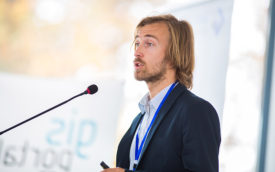
Freeman Dyson
It is difficult to summarize briefly the accomplishments of Freeman Dyson and their impact. Dyson, now retired was a long-time scholar at the Institute for Advanced Study in Princeton, New Jersey; he is perhaps best known in the space community as one of the great champions of space exploration and settlement, including serving as past-President of the Space Studies Institute in the early 2000s, for his invention of the “Dyson Sphere†concept, and his leadership in the development of the Orion space nuclear propulsion concept some 50 years ago. However, the brilliant physicist - originally from the UK - was from the 1940s forward also making seminal contributions in the fields of quantum mechanics, condensed matter physics, number theory, topology and other fields. Earlier still, in 1943 at the age of 20 he joined the Operational Research Section (ORS) of the Royal Air Force's Bomber Command where he developed analytical methods to enhance the bombing of targets in Nazi Germany during the Second World War. During his life, he attended Trinity College at Cambridge in the UK and was a professor at Cornell University in the US, before - despite never receiving a Ph.D. - begin appointed permanently in 1953 to the faculty of the Institute for Advanced Study in Princeton. Dyson's numerous innovative - and as he sometimes described them “subversive†- ideas are well-known by many in the space community; the Dyson Sphere concept, for example was featured in a 1992 episode of Star Trek - The Next Generationâ„¢ (Episode 130, Relics). A contemporary and colleague of Hans Bethe, Robert A. Oppenheimer, Richard Feynman and other giants of the 20th century, Dyson has been honored numerous times during his long and accomplished career, including election as a Fellow of the Royal Society (FRS) in 1952, being awarded the Lorentz Medal in 1966, the Max Planck Medal in 1969, the J. Robert Oppenheimer Memorial Prize in 1970, and the Harvey Prize in 1977. Freeman Dyson will be attending the National Space Society International Space Development Conference to accept the prestigious Heinlein Award for 2018, which has been awarded in past years to Dr. Neil Armstrong, Dr. Buzz Aldrin, Dr. Robert H. Goddard, Mr. Gene Roddenberry, Dr. Wernher von Braun, Sir Arthur C. Clarke and Dr. Gerard K. O’Neill.




